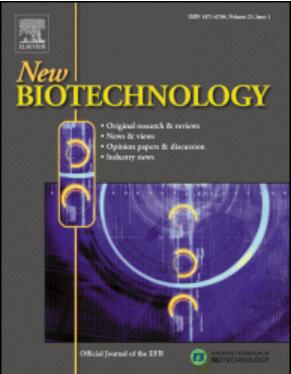Towards polyethylene terephthalate valorisation into PHB using an engineered Comamonas testosteroni strain
IF 4.5
2区 生物学
Q1 BIOCHEMICAL RESEARCH METHODS
引用次数: 0
Abstract
The abundant production of plastic materials, coupled with their recalcitrant nature, makes plastic waste a major challenge as a pollutant. Polyethylene terephthalate (PET) is a polyester formed by polycondensation of terephthalic acid (TPA) and ethylene glycol (EG). This plastic polymer can be completely depolymerized to its monomers using microbial enzymes. In this study, we verified in silico and in vivo that the bacterium Comamonas testosteroni RW31 is able to assimilate TPA and to produce the bioplastic polyhydroxybutyrate (PHB). This bacterium was engineered to heterologously express a fusion of the PET-degrading enzymes FAST-PETase and IsMHETase. We verified that our strain successfully secretes the enzymes and depolymerize PET both in vitro and in vivo, achieving a weight loss of 37.1 % and 0.83 %, respectively. We also studied its capacity to form biofilm. Furthermore, our strain can employ bis(2-hydroxyethyl) terephthalate (BHET), an intermediate of PET degradation, as feedstock to accumulate PHB up to 12.03 % of its dry weight in 14 h. Our findings highlight C. testosteroni RW31 as a promising chassis for synthetic biology strategies aimed at upcycling PET waste.
利用工程的睾酮单胞菌菌株将聚对苯二甲酸乙二醇酯转化为PHB。
塑料材料的大量生产,加上它们的顽固性,使塑料废物成为污染物的主要挑战。聚对苯二甲酸乙二醇酯(PET)是由对苯二甲酸(TPA)和乙二醇(EG)缩聚而成的聚酯。这种塑料聚合物可以用微生物酶完全解聚成它的单体。在这项研究中,我们在硅和体内验证了细菌Comamonas testosterone - steroni RW31能够吸收TPA并产生生物塑料聚羟基丁酸酯(PHB)。该细菌被改造成异种表达pet降解酶FAST-PETase和IsMHETase的融合。我们验证了我们的菌株在体外和体内都能成功地分泌酶并解聚PET,体重分别减轻了37.1%和0.83%。我们还研究了它形成生物膜的能力。此外,我们的菌株可以使用PET降解中间体双(2-羟乙基)对苯二甲酸乙二醇酯(BHET)作为原料,在14小时内积累PHB高达其干重的12.03%。我们的研究结果强调了C. testosterone RW31是一种很有前途的合成生物学策略,旨在对PET废物进行升级回收。
本文章由计算机程序翻译,如有差异,请以英文原文为准。
求助全文
约1分钟内获得全文
求助全文
来源期刊

New biotechnology
生物-生化研究方法
CiteScore
11.40
自引率
1.90%
发文量
77
审稿时长
1 months
期刊介绍:
New Biotechnology is the official journal of the European Federation of Biotechnology (EFB) and is published bimonthly. It covers both the science of biotechnology and its surrounding political, business and financial milieu. The journal publishes peer-reviewed basic research papers, authoritative reviews, feature articles and opinions in all areas of biotechnology. It reflects the full diversity of current biotechnology science, particularly those advances in research and practice that open opportunities for exploitation of knowledge, commercially or otherwise, together with news, discussion and comment on broader issues of general interest and concern. The outlook is fully international.
The scope of the journal includes the research, industrial and commercial aspects of biotechnology, in areas such as: Healthcare and Pharmaceuticals; Food and Agriculture; Biofuels; Genetic Engineering and Molecular Biology; Genomics and Synthetic Biology; Nanotechnology; Environment and Biodiversity; Biocatalysis; Bioremediation; Process engineering.
 求助内容:
求助内容: 应助结果提醒方式:
应助结果提醒方式:


